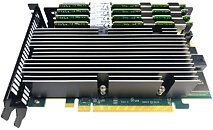
AMD Still Believes in Moore's Law, Unlike NVIDIA
Back in September, NVIDIA's Jensen Huang said that Moore's Law is dead, but it seems like AMD disagrees with NVIDIA, at least for now. According to an interview with AMD's CTO, Mark Papermaster, AMD still believes that Moore's Law will be alive for another six to eight years. However, AMD no longer believes that transistor density can be doubled every 18 to 24 months, while remaining in the same cost envelope. "I can see exciting new transistor technology for the next - as far as you can really plot these things out - about six to eight years, and it's very, very clear to me the advances that we're going to make to keep improving the transistor technology, but they're more expensive," Papermaster said.
AMD believes we'll see a change in how chips are being designed and put together, with chiplets being the future of semiconductors. Papermaster calls this "a Moore's Law equivalent, meaning that you continue to really double that capability every 18 to 24 months" although it's not exactly Moore's Law in the traditional sense. AMD also appears to be betting heavily on FPGA technology in some of its market segments, for something the company calls adaptive computing. As to how things will play out, time will tell, but with both AMD and Intel going down the chiplet route, albeit in slightly different ways, we should continue to see new innovations from both companies, with or without Moore's Law.
AMD believes we'll see a change in how chips are being designed and put together, with chiplets being the future of semiconductors. Papermaster calls this "a Moore's Law equivalent, meaning that you continue to really double that capability every 18 to 24 months" although it's not exactly Moore's Law in the traditional sense. AMD also appears to be betting heavily on FPGA technology in some of its market segments, for something the company calls adaptive computing. As to how things will play out, time will tell, but with both AMD and Intel going down the chiplet route, albeit in slightly different ways, we should continue to see new innovations from both companies, with or without Moore's Law.


































